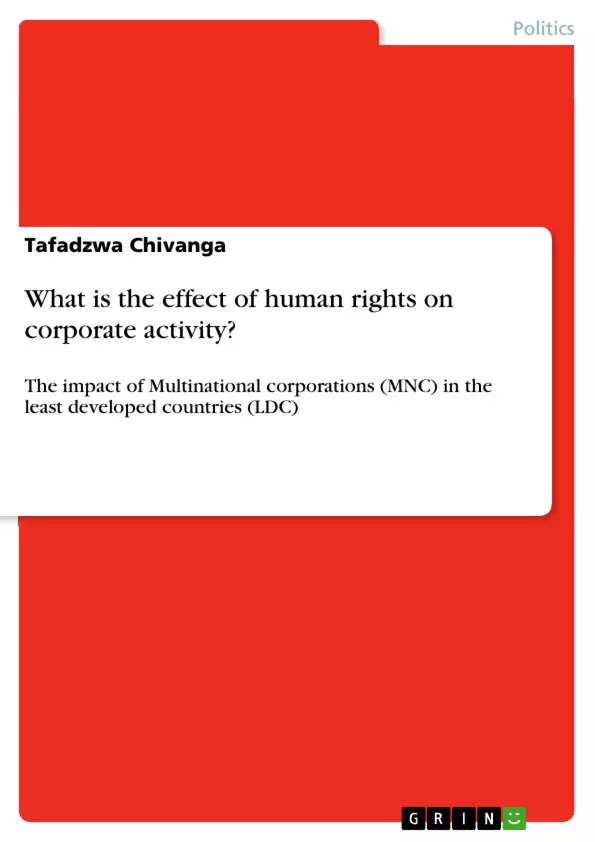The paper will highlight the controversies inherent in the operations of Multi National Corporations in the developing world by articulating how they would not have done the same business practices in the developed states. Why are there these major differences? These questions will be debunked in light of examples of major corporations’ activities such as Nike, copper extraction in the Zambian copper belt and the use of child labour in tea plantations in West Africa among others. The paper will conclude by analysing the various responses by different lobby groups to these shadowy business practices.
Inhaltsverzeichnis (Table of Contents)
- 1.0 Introduction
- 1.1 Definition of key terms
- 1.1.1 Human rights
- 1.1.2 Multinational Corporation
- 1.1.3 Least developed countries
- 2.0 Theoretical framework
- 2.1. Hymer thesis
- 2.2 Marxism
- 2.3 Gramscian hegemony
- 3.0 Discussion
- 3.1 Tax dodging
- 3.2 Children's rights
- 3.3 Pharmaceutical medical tests
- 3.4 Environmental exploitation
- 3.5 Meddling in domestic political affairs
- 3.6 Compromising health, safety and working conditions
- 4.0 Responses
- 4.1 Fairtrade
- 4.2 Anti sweatshops campaigns
- 4.3 Sanctions
Zielsetzung und Themenschwerpunkte (Objectives and Key Themes)
This essay examines the impact of Multinational Corporations (MNCs) on human rights in Least Developed Countries (LDCs). It explores the theoretical framework of MNC operations, highlighting the exploitative nature of their activities and the lack of accountability under international law. The essay uses examples of major corporations such as Nike and Glencore to illustrate how MNCs leverage their power and influence to prioritize profits over human rights.
- The exploitative relationship between MNCs and LDCs
- The lack of legal obligations for MNCs to adhere to international human rights law
- The use of illicit and unethical business practices by MNCs in LDCs
- The impact of MNC activities on the socio-economic fabric of LDCs
- Responses to MNC activities by lobby groups and international organizations
Zusammenfassung der Kapitel (Chapter Summaries)
- Introduction: This chapter establishes the context of the essay by outlining the exploitative relationship between MNCs and the developing world. It defines key terms like "human rights," "multinational corporation," and "least developed countries."
- Theoretical Framework: This chapter introduces three theoretical frameworks that underpin the essay's analysis: the Hymer thesis, Marxism, and Gramscian hegemony. These frameworks all emphasize the dependency and exploitative relationship of capital to labor in the context of transnational corporate activities.
- Discussion: This section examines the controversial operations of MNCs in developing countries, highlighting examples such as tax dodging, child labor, and environmental exploitation. It explores the ways in which MNCs prioritize profits over human rights and the consequences of their actions for the LDCs.
- Responses: This chapter investigates various responses to the unethical practices of MNCs, including initiatives like Fairtrade, anti-sweatshop campaigns, and sanctions.
Schlüsselwörter (Keywords)
The main keywords and focus topics of this text are: Multinational Corporations (MNCs), human rights, Least Developed Countries (LDCs), exploitation, tax avoidance, child labor, environmental exploitation, corporate social responsibility, Fairtrade, anti-sweatshop campaigns, sanctions, theoretical frameworks, Hymer thesis, Marxism, Gramscian hegemony, dependency theory, global hegemony.
Frequently Asked Questions
How do Multinational Corporations (MNCs) impact human rights in developing countries?
MNCs often prioritize profits over human rights in Least Developed Countries (LDCs), leading to issues like child labor, environmental exploitation, and poor working conditions that would not be tolerated in developed nations.
What are some common unethical business practices used by MNCs in LDCs?
Common practices include tax dodging, the use of child labor in plantations, environmental degradation through extraction activities, and compromising health and safety standards in workplaces.
Are MNCs legally obligated to follow international human rights law?
Currently, there is a significant lack of direct legal accountability for MNCs under international law regarding human rights, which allows many to operate with impunity in regions with weak domestic regulations.
What theoretical frameworks explain the behavior of MNCs?
The essay discusses the Hymer thesis, Marxism, and Gramscian hegemony to analyze the exploitative relationship between global capital and labor in developing markets.
What are some international responses to unethical corporate activities?
Responses include the Fairtrade movement, anti-sweatshop campaigns led by lobby groups, and the implementation of international sanctions against non-compliant entities.
- Citation du texte
- Tafadzwa Chivanga (Auteur), 2015, What is the effect of human rights on corporate activity?, Munich, GRIN Verlag, https://www.grin.com/document/355095



